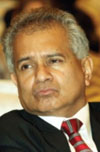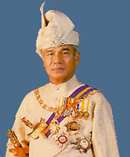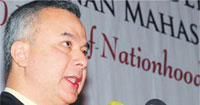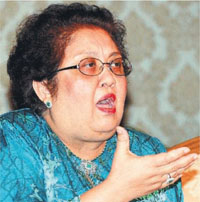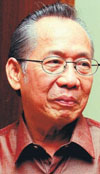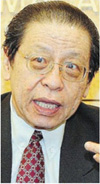|
Unity first and last
Raja Nazrin: Constitution provides adequate protection
Raja Nazrin outlines three essentials for effective bation-building
|
| |
|
New Straits Times(Used by permission)
by Shamini Darshni and Minderjeet Kaur
Raja Nazrin speaks his mind...
Students boo over remarks that they can freely express views
Question on NEP sets off exchange
Politicians should not be in sports bodies?BR>
KUALA LUMPUR: Get a copy of the Federal Constitution and read it.
The Raja Muda of Perak, Raja Dr Nazrin Shah, in making the call to young Malaysians, said protecting the integrity of the Constitution was every Malaysian£r way of promoting national unity.
"The Constitution is the supreme law of the land. It guarantees the rights of every Malaysian. The integrity of that document must be protected at all cost," he said to applause at the first Malaysian Student Leaders Summit 2007 here yesterday.
The Constitution was a cleverly crafted document which clearly provided for adequate checks and balances against excesses through the separation of powers between the executive, the legislature and the judiciary, each protected from encroachment by the other, he said.
"It has often been said that many a misunderstanding may be avoided if principles embodied in the Constitution are adhered to strictly. Upholding the rule of law is paramount," said Raja Nazrin.
In a keynote address greeted by cheers and nods of agreement, he set forth several points for Malaysians to play their part in nation-building and integration.
The rakyat, he said, should take time to study the nation£r history, particularly the lives and works of past leaders, citing Tun Dr Ismail Abdul Rahman as an example.
He called on Malaysians to take personal ownership over the well-being of the country.
"Do not succumb to indifference and apathy. Hold on to your ideals. Do not give way to cynicism and opportunism. Believe that you can make a difference."
Raja Nazrin said Malaysians should be active in community service geared towards promoting interaction between communities.
He also emphasised serving the country to the best of one£r abilities, be it in the civil service or staying to preserve or be a part of human capital growth.
On racial integration, Raja Nazrin said interaction between different ethnic groups seemed more of an urban phenomenon.
"In recent years, ethnic identities appear to have become more explicit. In some instances, what divides us has become more emphasised than what unites us."
Malaysians were sadly showing signs of polarisation along ethnic and religious lines.
"Some groups bear grudges against what is perceived as preferential treatment. Others regard preferential treatment as their indisputable right."
Matters of faith, he said, were becoming topics of immense controversy. "They promote overzealousness and coercive action, and drive Malaysians further and further away from each other.
"Our diversity was meant to be our unique asset. The Federal Constitution and the Rukun Negara institutionalised living together in peaceful, harmonious coexistence. Yet 50 years after Merdeka, we are still grappling with concerns about unity."
Raja Nazrin suggested three ways for effective and sustained nation-building ?the first is upholding the Constitution.
The second, is economic and social justice.
"The people you work and play with, the friendships you make, must never be constrained by ethnicity. Pre-conceptions, parochialism and chauvinism can be eradicated if we interact actively with others of a different ethnic group or religion, even if it is just one teacher, one policeman or one classmate."
The third, is good governance and a thriving civil society. "Only those who are capable, responsible and scrupulously honest should be allowed to serve in positions of leadership. Those who are inefficient, incompetent and, most importantly, corrupt, should be held in absolute contempt."
It was very important, he added, to have leaders who were earnest in building unity and did not resort to religious or ethnic posturing to further their careers.
Malaysians of all races and religions need to believe beyond a shadow of a doubt that they have a place under the Malaysian sun.
Raja Nazrin speaks his mind...
"FIFTY years of the national relay race has been run and we have covered a good distance and achieved much.
However, every coin has two sides.
Let us not be naive in thinking it is all a rosy picture. There is still much room for improvement.
Interaction between the ethnic groups, to the extent that it exists, remains more of an urban phenomenon. In recent years, ethnic identities appear to have become more explicit. In some instances, what divides us has become more emphasised than what unites us.
Moreover, the impasse at the global level between Islam and non-Islam affects even a moderate country like Malaysia.
Matters of faith are topics of immense controversy. They provoke overzealousness and coercive action, and drive Malaysians further and further away from each other.
Our diversity was meant to be our unique asset. The Federal Constitution and the Rukun Negara institutionalised living together in peaceful, harmonious co-existence.
YET, 50 YEARS AFTER MERDEKA, WE ARE STILL GRAPPLING WITH CONCERNS ABOUT UNITY.
It is also very important we have leaders who are earnest in maintaining unity, never resorting to religious or ethnic posturing to further their political careers at the expense of peace and security. If they fail, they must be held accountable and made answerable before the law.
Malaysia needs a future generation of leaders with unquestionable integrity. Only those who are capable, responsible and scrupulously honest should be allowed to serve in positions of leadership. Those who are inefficient, incompetent and, most importantly, corrupt, should be held in absolute contempt.
The current phase of nation-building should be in tune with the temper of the times to reflect new realities of the modern world. We are facing a globalised environment where excellence and meritocracy are the rules of the game. The opportunities in the global world reward those with ability, regardless of colour or creed.
A multi-ethnic country like Malaysia has to be especially watchful since, in the absence of a strong national identity, we are prone to polarisation and competition along ethno-religious lines.
The Constitution is the supreme law of the country which guarantees fundamental liberties to every citizen. A cleverly crafted document, it clearly provides for adequate checks and balances against excesses through the separation of powers between the executive, legislative and judicial branches ?with each protected from encroachment by the other.
It has often been said that many a misunderstanding may be avoided if the principles embodied in the Constitution are adhered to strictly.
Upholding the rule of law is paramount.
In this connection, I can do no better than to quote the words of Baroness Helena Kennedy QC, a leading jurist: ¡naw is the bedrock of a nation; it tells us who we are, what we value. It regulates our human relationships one to the other and our relationships as citizens with the state... The rule of law is one of the tools we use in our stumbling progress towards civilising the human condition: A structure of law, with proper methods and independent judges, before whom even a government must be answerable... WE HAVE TO STAND UP AND BE COUNTED. WE HAVE TO PROTECT THE THINGS THAT MAKE OUR NATIONS GREAT... "
Students boo over remarks that they can freely express views |
|
KUALA LUMPUR: Boos and catcalls greeted Datuk Rafiah Salim when she said public university students had the freedom to express their thoughts and ideas.
Several hundred dissenting voices rang out when the Universiti Malaya vice-chancellor, when taking a question from the floor, said there was "no such thing as students being unable to address their concerns".
Hearing their disapproval, Rafiah retorted: "Behaviour like this is exactly what causes people not to respect you. You won£s even give me a hearing. And you won't get respect.
|
| |
|
"If you behave like that, nobody will listen to you because it is not worth listening. You are not respecting others."
Higher Education Minister Datuk Mustapa Mohamed, who attended the summit, was also not spared hard questions.
He was asked if universities created thinking students and if there was a platform for students to discuss issues.
Mustapa replied: "Our education is still exam-oriented and we are in the process of changing. But, the change cannot be done overnight."
He added that Malaysia was a young country and there were a lot of sensitive issues because of the multiracial and multireligious nature of Malaysian society.
He said the ministry had organised opportunities for students to discuss issues with Prime Minister Datuk Seri Abdullah Ahmad Badawi and Deputy Prime Minister Datuk Seri Najib Razak.
"They voiced radical opinions and stated what they expected from the government."
Question on NEP sets off exchange
KUALA LUMPUR: A talk on the New Economic Policy by Prof Datuk Dr Shamsul Amri Baharudin went smoothly ?until question time.
Participants of the Ma-laysian Student Leaders Summit 2007 then ripped into him, accusing him of skirting the issue.
The Universiti Kebangsaan Malaysia anthropology lecturer£r topic was "New Economic Policy ?Is it still relevant?" The students felt he had not answered the question.
One student walked up and said: "We have been listening to you for almost an hour and, finally, when you came to the question in the topic, you dropped it like a hot potato."
Shamsul replied: "Unless you were sleeping, the answer is actually on the last slide that I showed. We have two solutions, either we retain the status quo or we change the Constitution."
The student was not satisfied. "You haven't answered the question. In your opinion, is it still relevant?"
Shamsul said: "The question of whether it is relevant or not is not up to us to decide, but up to the people to decide. You should push the wakil rakyat (elected representatives) for a change. I challenge you to ask him to change."
The student persisted: "As an academic, what is your opinion?"
Shamsul said the NEP"provision is still there and Malaysians should look at it from every angle".
"Every part has to be negotiated. For instance, we still need a work permit to work in Sabah or Sarawak.
"My suggestion is that we need to look at every part before deciding if it is still relevant."
He received loud applause from the floor for this.
In his talk, Shamsul gave the background to the Constitution and how the NEP was created. He also spoke about the racial riots of May 13, 1969, even relating his personal experience.
His last slide ended with the question: "Is the NEP relevant?"
The participants also applauded fellow students who asked tough questions and also when several students suggested that the NEP be extended to poor Malaysians, regardless of race or religion.
The two-day summit was attended by mostly Malaysian students studying in foreign universities. |
| |
| Politicians should not be in sports bodies? |
|
KUALA LUMPUR: Put the right people in charge and maybe the standard of sports will improve, said Professor Emeritus Datuk Khoo Kay Kim.
He said when he was in charge of the sports centre at the Universiti Malaya, bureaucracy was a problem.
"I said we will take in students based on their experience in sports, but the ministry said we must take in students based on their STPM results. What£r the point?
"I don£s know whether these students could distinguish between a rugby ball and a football," he said to laughter. |
| |
|
Khoo compared Malaysia£r showing in the Asian Games in Bangkok 40 years ago and last year. "In 1966, Malaysia won seven gold medals, five from athletics. Last year, in Doha, we hardly had any participation in athletics.
"I hope politicians will keep out of sports associations."
In the earlier days, he said, there were ethnic-based sports associations that used to compete with each other.
"There were fights but no ethnic conflicts. Each time a team was picked to represent the town, district or state, it would comprise all races.
"The Chinese in the Selangor team and the Chinese in the Perak team would not be friends. If a Perak Chinese hurt a Selangor Malay player, the Selangor Chinese player would attack the Perak Chinese player. That£r how things were then."
Do it at at the Annual General Meeting for UMNO
Written by Fahri Azzat on 07 August, 2007 at 14:26 PM
The good Raja Muda of Perak is saying good and important things but if he were more serious about what he says and whom he says it too his Highness should try to book a slot at an UMNO AGM and deliver this same speech. I'd recommend some armed guards too (what with all the Kerises no doubt that would be waved about).
Fahri Azzat |
| |
| .............................................................................................................................................................................................................................. |
|
| |
| Used By Permission of The Malaysian Bar Website
Law conference to tackle hot issues
Tuesday, 12 June 2007, 01:31pm
Malaysiakini (Used by permission)
In recent times, issues and debates concerning the freedom of religion have been dominating the conversations of businessmen and politicians as well as your local hawkers and taxi drivers.
The name Lina Joy is no more foreign to the lips of Malaysians. Apostasy is no longer a distant issue concerning non-Muslims.
People are asking where the line starts between the Federal Court and ends at the Syariah Courts. The grey area of freedom of religion in Malaysia, a multi-racial, multi-religious country is now in contention.
And this debate looks set to continue at the forthcoming Malaysian Law Conference to be held from Oct 29 -31.
¡°There will be a session on freedom of religion where a few distinguished speakers will speak about the recent Lina Joy case¡±, said Roger Tan, chairperson of the organising committee for the conference.
The conference will devote its second day to issues on constitutional law and how the constitution has developed since Malaysia¡¯s independence.
Other topics to be deliberated include trade and globalisation, Islamic commercial law, Orang Asli and the Constitution, freedom of the arts and gender issues.
Tan added that the topics at the forum were aimed at examining the development of the laws after 50 years of independence.
They will also reflect Malaysia¡¯s achievements, raising present isses and challenges, and generating discussion of the way forward in the next 50 years.
The conference aims to attract 1,000 delegates this year, up from the usual 500 delegates.
Rare honour
A major attraction of this year¡¯s conference is the opening address by the Sultan of Perak, Sultan Azlan Shah and the keynote address by the Prime Minister, Abdullah Ahmad Badawi.
Sultan Azlan Shah¡¯s speech entitled ¡¯50 years of Constitutionalism and the Rule of Law¡¯ will reflect the conference¡¯s theme of ¡¯50 years of Merdeka¡¯.
¡°This is a rare honour to have the Sultan and Prime Minister deliver the opening and keynote addresses. It is a great opportunity for members of the bar to turn up in full force,¡± said Tan.
The conference will also feature speakers from the Malaysian Bar, judiciary, Attorney-General¡¯s Chambers, Judicial and Legal Services, corporate sectors, local universities, NGOs and foreign Bar associations.
The conference will be held on Oct 29 to 31 October at the
Kuala Lumpur Convention Centre.
|
| |
| .............................................................................................................................................................................................................................. |
|
| |
Used With Permission of The Malaysian Bar Website |
| Comment: Dialogue key to mutual understanding |
| Contributed by Yeo Yang Poh |
| Thursday, 14 June 2007, 07:47am |
|
The Sun (Used by permission)
by Yeo Yang Poh
In a meaningful dialogue, points and counterpoints can be exchanged, not in competition with one another, but with the view to better mutual understanding, to establishing commonalities, and to finding possibilities amidst a climate of perceived impossibilities. |
| |
|
The Lina Joy dispute is certainly not a case of contest between (or among) religions. No one has been asked to decide which religion wins or should prevail. No one should. God is not on trial. He is watching the trial, and how each player in it exercises his or her conscience.
Neither is the case just about how the Constitution should be interpreted strictly as a legal document. To consider it to be merely so is to put justice to death, and then to dutifully dissect the dead body and analyse its parts after all life in it is gone.
It is meaningless to construe any Constitution as if it were a puzzle composed of mathematical logic, without carefully accounting for the continuous evolution of the concepts and boundaries of freedoms and rights, not just within the context of the society or community concerned, but universally.
The Federal Constitution is, as any Constitution worth the paper it is written on should be, a living document that proactively promotes and protects freedoms, not just by their strict letters but also by invoking the spirit that surrounds or ought to surround it.
Hence, the underlying essence of Lina£r case, notwithstanding the uncoloured legal questions framed, is neither principally about religion nor primarily about the law.
What then is it about, looking beyond the immediate scope of the case?
Lina case is about freedom, about the rights of individuals, about the extent to which our society as a whole is prepared to respect such freedom and rights, and about the degree to which our justice system is willing to lead rather than tail the society in recognising, promoting and protecting these freedoms and rights.
Just as freedom of speech is not about speech (or the contents of any particular speech), but about the provision of space (with the absence of punishment) for the expression of opinions whether or not approved by the majority or by those in control; freedom of religion is not about religion (or the contents of any religion), but about allowing (again without punishment) every individual to pursue his or her own path of enlightenment whether or not shared or approved by others or by those in power.
The permission of this freedom for all is essential to the existence of true equality and mutual respect within any society. Whether viewed from a religious aspect or otherwise, what good can it do, and how meaningful could it be, for society or any community within a society to, directly or indirectly, impose or force upon any person a set of ideas or beliefs to which that person does not subscribe from the heart?
Different persons look at Lina£r case in different ways, each perhaps convinced of the soundness of his or her perspective. Some of these viewpoints are difficult to reconcile. In the circumstances, the easiest thing is for us to respectively throw our arms in despair, and be resigned to the conviction that others will never understand our point of view, and hence to the futility of continuing to talk to one another.
That is the easiest thing to do, in times of frustration, but is also the surest way to self-condemnation. Granted that these are difficult issues, and granted that at times a mutually acceptable solution appears to be forever impossible; yet it is crucial that constructive dialogue must continue, for otherwise destructive conflicts will quickly fill its space.
There are, as an illustration of diverse points of view, those who truly feel that Lina is misguided, and who wish to guide her back to the right path. Such perspective, repugnant as it may appear to some, should not be scoffed at or dismissed as silly. To do that will be to commit the same error that we feel others have made when they brush aside arguments that we find irrefutable; and therefore to do that will be to keep widening the divide between groups with different opinions.
The appropriate response, once again, lies in dialogue. In a constructive dialogue, other viewpoints can be offered in response, such as the view that a pre-requisite starting point in wanting to guide a person is to first respect that person as an individual; and that it can hardly be genuine respect if the treatment given is coercive in nature.
In a meaningful dialogue, points and counterpoints can be exchanged, not in competition with one another, but with the view to better mutual understanding, to establishing commonalities, and to finding possibilities amidst a climate of perceived impossibilities.
Progress through dialogue may be painfully slow, but there is no viable substitute. There are also obstacles that need to be overcome along the snail-crawl, such as the low level of mutual trust, and the interference of politics.
Another hurdle is the management of emotions. Politicians are fond of branding a topic ¥Oensitive? when it suits them, in the hope of prohibiting or limiting its public discussion. This always makes the problem progressively worse. Then, when public discussion becomes inevitable, they will say that people should not be ¥Amotional?in raising issues, as if emotion is a dirty word per se, and as if human beings can function entirely free of emotion in a robotic manner. They will demand that discussion stops, if emotion is detected.
It is time to recognise that one cannot be expected to discuss an issue, such as freedom or religion, which one feels passionate about, without the involvement of any emotion whatsoever. To be emotional is not necessarily the same as being irrational. One can be in a state of happiness, anger, frustration, anxiety or compassion (all of which are emotions), without being irrational.
Therefore, in all dialogues it is the degree of emotion (the runaway kind that drags away rationality along with it) that needs to be managed or avoided, and not the need to meet the impractical demand of total absence of emotion. It is, however, essential to maintain mutual respect throughout the process, and to gradually build mutual trust. The fact that an issue is termed ¥Oensitive? or that people may exhibit emotions when expressing opinions on it, cannot be an excuse to suppress discussion or dialogue; unless one wishes to see a difficult problem silently turning into an uncontrollable monster.
So, however one looks at Lina£r case, one thing is clear. The decision in that case is not a victory for our society at all. It is just a manifestation of unresolved issues. We, our society as a whole, must undertake the task of resolving them, eventually.
Freedom is not about the majority, or those in power, being allowed to do as they please. Freedom is about every member of society, including the minority and the weakest in it, being given the same opportunity and the same latitude that the rest (including the majority and the powerful) enjoys in abundance.
The writer is the immediate past president of the Malaysian Bar.
MAJORITY RULE AND MINORITY RIGHTS
Written by Stephen Tan Ban Cheng on 14 June, 2007 at 13:31 PM
Any Constitution, in theory, is a sacred document that spells out the rights and duties of all citizens in any country.
In theory at least, it is designed to prevent the minority from suffering the "tyranny of the majority," a phrase used by both Alexis de Tocqueville and John Stuart Mill.
In fact, how the rights of the minority are respected determine the healthiness or otherwise of liberty in any country. That is why in a democracy, when we talk about majority rule on the one hand, we also talk about minority rights. They go together.
Enough said before I become the god or goddess with many hands!
Stephen Tan Ban Cheng |
| |
| .............................................................................................................................................................................................................................. |
|
| |
| Used With Permission of The Malaysian Bar Website |
After Lina Joy case - Malaysia, Quo Vadis! |
| Thursday, 31 May 2007, 04:57pm |
| by Lim Kit Siang |
|
The Federal Court 2-1 majority decision rejecting Lina Joy£r appeal marks a tectonic shift of Malaysia in moving further and further away from the Merdeka ¤ocial Contract?founding principles of nation-building agreed by the forefathers of the major communities on the attainment of independent nationhood.
It casts a larger shadow over the national horizon with the country entering the second half-century of nationhood, with increasing doubts among Malaysians about the meaning, permanence, sustainability and viability of constitutional guarantees, civil liberties and fundamental rights.
This is because the Lina Joy case has shattered confidence in the constitutional guarantees on freedom of religion,
the Constitution as the supreme law of the land and above all, the sacred Merdeka Social Contract underlying the Constitution that Malaysia is a secular nation with Islam as the official religion but not an Islamic state.
|
| |
|
Malaysians alarmed at the abandonment of the Social Contract principles are fully justified in their concerns, especially when one compares as to what would have happened to a Lina Joy case in the first quarter-century of the nation history as compared to today when the nation stands on its 50th year of nationhood!
After the disappointing Lina Joy judgment of the Federal Court yesterday, voices were heard from some Islamic groups urging those hoping for an opposite outcome to reconsider their position and to consider modifying their expectations to suit what is good and more sustainable considering our realities?.
Moderate Malaysians, both Muslim and non-Muslim, must be very concerned by such voices as the same argument with the very same words could be used to justify the complete abandonment of the fundamental secular principle of the ¤ocial Contract?for the establishment of an Islamic State!
On the occasion of Malaysia 50th Merdeka anniversary, the question that must be asked and answered by all Malaysians is: Malaysia? |
| |
| .............................................................................................................................................................................................................................. |
|
| |
| PRESS RELEASE: Lina Joy Decision |
| Contributed by Ambiga Sreenevasan |
| Thursday, 31 May 2007, 11:35pm |
|
Bar Council: Federal Constitution must remain supreme
The right guaranteed by Article 11 grants every person the freedom to choose, affirm, practise and profess the religion of his/her choice. This freedom of belief is (and must be) an unqualified freedom fully protected by the law. Any law that prevents or in substance curtails the exercise of this freedom must be struck down as being inconsistent with the Federal Constitution, and as being incongruous with such a fundamental freedom. |
| |
|
Further, the religion that a person in fact professes must be the religion that that person states he or she professes; since there can be no evidential difficulty in ascertaining this in the case of a living person. Asserting this right, and upholding it, in no way undermines the position of any religion under the Federal Constitution and is consistent with the position of Islam under Article 3.
The Federal Constitution is, and must remain in law, supreme. In the event of any inconsistency or conflict between the provisions of State Enactments and of the Federal Constitution, the latter must prevail. The majority decision in the Lina Joy case pronounced yesterday runs counter to this position. In this decision, the express provisions of the Federal Constitution were made to give way to an interpretation of some form of implied jurisdiction of the Syariah Courts. It further clothed the National Registration Department with powers beyond that which was expressly provided for under the relevant legislation.
The implied jurisdiction approach runs contrary to the legal position that State law must confer on the Syariah Court express jurisdiction to deal with any matters stated in the State List. The majority decision has implied such jurisdiction in the absence of statutory provisions to that effect, which in any event must accord with the Federal Constitution in order to be valid. In short the majority of the Federal Court has also proceeded to ¡°legislate¡±, (which the Courts are not permitted to do) and in a manner inconsistent with the Federal Constitution.
We support the minority judgment of Justice Dato' Richard Malanjum HMP, who stated that,
¡° jurisdiction must be express and not implied. The doctrine of implied powers must be limited to those matters that are necessary for the performance of a legal grant. And in the matters of fundamental rights there must be as far as possible be express authorization for curtailment or violation of fundamental freedoms. No court or authority should be easily allowed to have implied powers to curtail rights constitutionally granted. ¡± (emphasis ours)
We must further heed the warning of the learned Judge that ¡° ¡ to rely on implied power as a source of jurisdiction would set an unhealthy trend. ¡±
The Judgment further noted that it was unreasonable ¡°to expect the Appellant to apply for a certificate of apostasy when to do so would likely expose her to a range of offences under the Islamic law¡±. Little comfort is drawn from cases of those who wish to leave or change religion, who have faced criminal sanctions and most recently the case of Revathi in Malacca who was deprived of her liberty and access to her husband and minor child.
It is important that this minority Judgment be given careful consideration.
We are mindful that issues relating to religion will inevitably draw emotive responses. However in a multi-religious society like ours, Malaysians must be prepared to confront these issues maturely and dispassionately, and within the framework of our Federal Constitution as the supreme law of the land.
Finally, we would commend the approach of the late Tun Mohamed Suffian in such cases where he said,
¡° In a multi-racial and multi-religious society like yours and mine, while we judges cannot help being Malay or Chinese or Indian; or being Muslim or Buddhist or Hindu or whatever, we strive not to be too identified with any particular race or religion ¨C so that nobody reading our judgment with our name deleted could with confidence identify our race or religion, and so that the various communities, especially minority communities, are assured that we will not allow their rights to be trampled underfoot.¡± (The Constitution of Malaysia - Further Perspectives and Developments).
Ambiga Sreenevasan
President
Malaysian Bar
31 May 2007 |
| |
| .............................................................................................................................................................................................................................. |
|
| |
|
